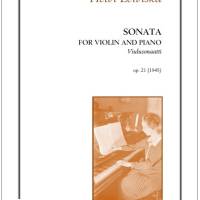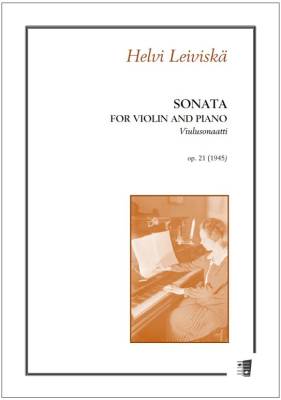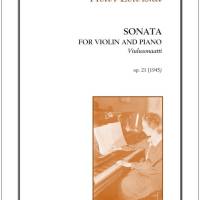Sonata for violin and piano op. 21 (1945) — Viulusonaatti op. 21 (1945)
Leiviskä, HelviProduct information
| Title: | Sonata for violin and piano op. 21 (1945) — Viulusonaatti op. 21 (1945) | ||
| Authors: | Leiviskä, Helvi (Composer) Välimäki, Susanna (Preface by) |
||
| Product number: | 9790550117563 | ||
| Product form: | Sheet music | ||
| Availability: | Delivery in 3-7 days | ||
| Publication date: | 13.5.2022 | ||
| Price per piece: | 32,20 € (28,37 € vat 0 %) | ||
|
|||
| Publisher: | Fennica Gehrman |
| Edition: | 2022 |
| Publication year: | 2022 |
| Language: | English, Finnish |
| Pages: | 63 |
| Product family: | Strings Violin Celebrating women composers |
| Finnish library classification: | 78.71 Viulu |
| Key words: | viulusonaatit, naissäveltäjät |
Related links
Other formats or variants

|
Digital download, 2022 |
25,80 €
|
Finnish composer Helvi Leiviskä (1902-1982) created a broad-based output of orchestral works, solo songs and chamber music. Her style could be described as moderate modernism, deriving influences from multiple sources such as late Romanticism, Symbolism, Expressionism, Existentialism and Neo-Classicism. Leiviskä's output is characterised by philosophical and religious themes, images of nature and narrative structures. Many of her works focus on human existential angst and spiritual searching and growth.
The Sonata for violin and piano in G minor op. 21 by Helvi Leiviskä (1945) is a grand, passionate quest narrative. Lasting about 25 minutes, it is as demanding as a virtuoso concerto: most of its texture is like an extended cadenza, with expansive leaps, arpeggios, double stops and extensive use of the high register. The opening movement also includes syncopated pulsation, tumultuous polyrhythms reminiscent of Brahms and an edginess that harks back to Sibelius's Violin Concerto.
Have a look inside by clicking "sample".
The Sonata for violin and piano in G minor op. 21 by Helvi Leiviskä (1945) is a grand, passionate quest narrative. Lasting about 25 minutes, it is as demanding as a virtuoso concerto: most of its texture is like an extended cadenza, with expansive leaps, arpeggios, double stops and extensive use of the high register. The opening movement also includes syncopated pulsation, tumultuous polyrhythms reminiscent of Brahms and an edginess that harks back to Sibelius's Violin Concerto.
Have a look inside by clicking "sample".




